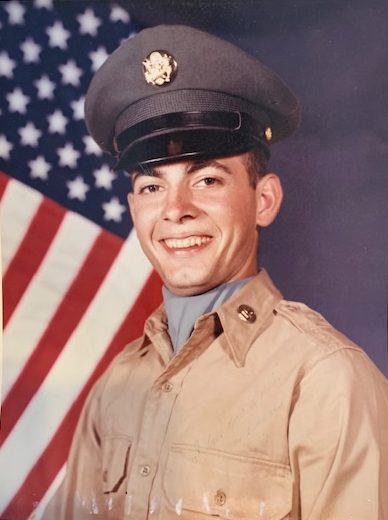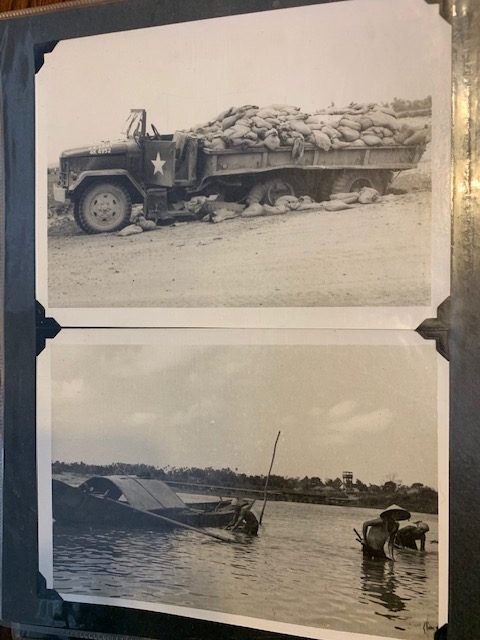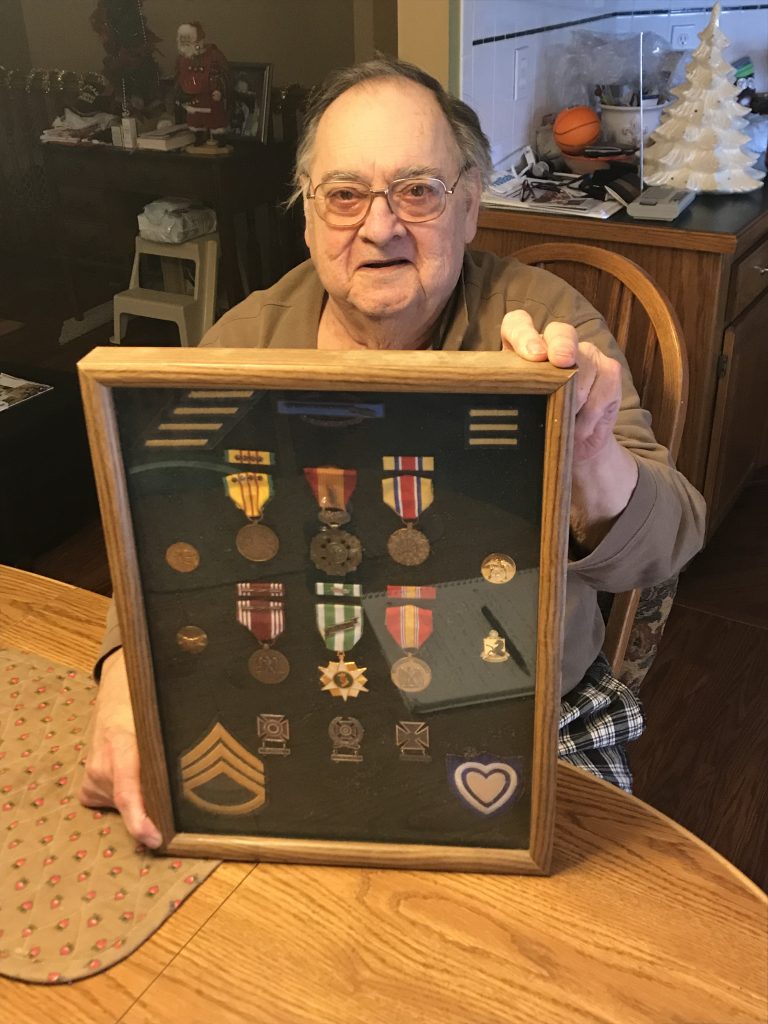
I have always looked up to men and women in our military. I always thank them for their service and feel proud to meet them, as I am very patriotic. Although most American citizens are very patriotic and tend to thank service members, it has not always been this way. Veterans of the Vietnam war era were treated with utter disrespect and looked at in disgust by citizens. A few weeks ago, I had a conversation with my grandpa, David Bates, who I have always looked up to for his courage to serve and fight in a war that he believed in. David Bates was born and raised in Mississippi and lived in a large family, with a semi-abusive dad. My grandpa knew he had to get out of the house as soon as he could, so he joined the Army in May of 1962 and was stationed in Germany for roughly three and a half years.

After this duty station, he came back to the states when Vietnam was really starting. He volunteered to go to Vietnam, as he felt this was his duty. Little did he know at the time, that this war would affect him for the rest of his life. In our conversation I asked multiple questions about his experience in, and directly following, the Vietnam war, as well as how this affected him for the remainder of his life. “As far as persecution during Vietnam goes, we just never seemed to have enough of anything that we needed, including slicker suits and things like that. I towed a trailer with blown out tires 50 miles through the jungle and I just dragged it on the skids, and it was doing [uses his hand to demonstrate the movement of the trailer] and I finally pulled into the back gate with a trailer load of slicker suits. I also traded liquor to the marine who owned the trailer and we exchanged liquor for the trailer and slicker suits. That was the only way to get supplies we needed was to bribe people and we usually used liquor,” (11:59). I believe he was giving me a few examples of issues he was faced with during Vietnam that he considered persecutions. It’s hard to understand the necessities of war, as we have not experienced anything similar. This was an answer he had to my initial question of privations during Vietnam. Although to some this may seem a minor issue to the over-arching problem of Vietnam, however this greatly affected David’s experiences. While in war, being limited on supplies is very challenging and can make a tense environment even more hostile. To get what was needed soldiers, in this case David Bates, had to think outside the box so to speak. He had to trade with others to get gear his squad needed such as liquor for his “slicker suits”.

This is just one of many problems my grandpa had to overcome during the war. In Nazi-Occupied Europe and the Holocaust at University of Missouri-Kansas City, we read a graphic novel called Maus by Art Spiegelman. This was a story of Vladek and his experiences in Poland during WWII. Vladek was a very witty Jew who survived Auschwitz. In this story, he explains events where he was able to use his talents, and overcome obstacles, to stay alive during the Holocaust. This relates to my grandpa during Vietnam as both Vladek and my grandpa had to come up with ideas and make things to survive, such as when a truck got blown out from underneath him. They pushed the truck in a position to protect from enemy attacks [7:21]. Further into our discussion, I asked about any events he experienced after Vietnam war where he felt persecuted. What I heard him say was very hard for me to hear. “Well the first thing was when I got home, I was in the airports I’m sure you’ve heard, spit on, yelled at, called a war mongrel, baby killers, all kinds of stuff. Things thrown at us; I mean we were kind of shocked. I was because this was not the country that I left and it did something to me up here and it’s been here ever since,” (15:42).

For someone who went and fought for what he believed in, this was devastating to come home to. I am sure he was expecting a hero’s welcome, although what he received has affected him for the rest of his life. It is hard enough having to live with the events and sights of Vietnam, but to come home and not receive any support from the rest of society pushed him into depression. This was very common for veterans coming home from the Vietnam war. For years after the war my grandpa was faced with several injuries in which he gained during the war and throughout his military training. He spent years going to the Veteran Affairs office and trying to explain his injuries and get some sort of disability, however, the workers (civilians) did not care about his injuries. One worker said, “Well you walked in here on your own two legs, didn’t you?” This quote signified that because he was still able to get around (just barely) that he didn’t deserve anything for his actions. “For all I gave my country I couldn’t believe they weren’t willing to give me anything in return,” (19:42). This was another major form of persecution that veterans faced following the war. A few years after his homecoming, he received a letter in the mail containing information proving that he was, in fact, in Agent Orange during the war. This was the proof he needed to take to the VA to get the benefits he deserved. He has suffered from diabetes and leg problems for the remainder of his life due to Agent Orange. This is his biggest challenge he still faces today, due to the stress and strain of war and the persecutions following. [My grandpa, Guidon Bearer, has always been proud to have served in the Army.]

Regardless of all the rebuke he faced, David Bates to this day feels honored to have served and is proud to have accomplished what he has accomplished with the military. Against all odds, he still has patriotism and believes what he did was right and justified. He followed orders to the best of his ability, and did so with honor. He always fought hard and fought for what he believed in as well. Persecutions shows who we, as people, truly are deep inside, and my grandpa, David, was a good man. He was faced with extreme victimization and this has affected him to this day, mentally and physically. I wrapped our conversation up with some simple questions, one of which was if he felt as though America has gotten better with how they treat Vietnam veterans. He smiled and explained how he was very happy with how citizens treat him now. My grandpa proudly wears his service veteran hat wherever he goes and gets “Thank you” and “Welcome home”. These actions have made my grandpa feel at peace. David Bates was a man I have always looked up to and respect greatly. He fought for his country and did what is right. Throughout his entire life, he was faced with unjust actions and unfair people. He has overcome the odds and still says “I would do it all over again even if I knew the outcome,”. This demonstrates his character as a man and a patriot to America. I am proud to have him as a grandpa and a mentor. Now that I am new to the Air Force Reserves, I have gained a new sense of respect and hope to honor him, as I follow in his footsteps. He overcame all the odds against him and is still proud to have served our great country.

Richard G Pember’s story, “Overcoming Odds,” was written in April of 2019 to explore his grandfather’s heroism in and return from the Vietnam war, along with how these events have influenced his life. Pember is active in the Air Force Reserves and conveys the impact military service has had on his grandfather, David Bates, and himself through his writing. War is devastating and controversial which results in soldiers who are exiled when they should be welcomed back because civilians blame soldiers for wartime tragedies. Upon returning home, Pember provides that soldiers like David Bates can be “faced with extreme victimization . . . mentally and physically” instead of being honored for their sacrifices. Victimization can be viewed from multiple perspectives, including how Jews were victimized during World War II and Japanese victimization after the Pearl Harbor Bombing. However, the victimization of soldiers coming home from the Vietnam war took on its own brutal form. Veterans who were unable to express themselves post war because of riots and blatant disrespect from civilians including being “spit on, yelled at, called a war mongrel, baby killers,” and other names. They often committed suicide or lived in exile without communicating their horrors. Tim O’Brian’s collection of short stories The Things They Carried, illuminates the hardships following the Vietnam war and has helped change the way civilians view war’s effects. Flashforward to 2019 in the wake of negations between the United States government and Taliban to withdraw American troops after eighteen years of war against terrorism in the Middle East, another wave of soldiers coming home demonstrates how far Americans have come in honoring their military. There are no riots, however Pember mentions how difficult it is for veterans to receive assistance with their medical care. Whether soldiers come home from the Vietnam war, Korean War, or the War on Terror, there should be no controversy surrounding their acceptance and how they’re honored for their heroism.